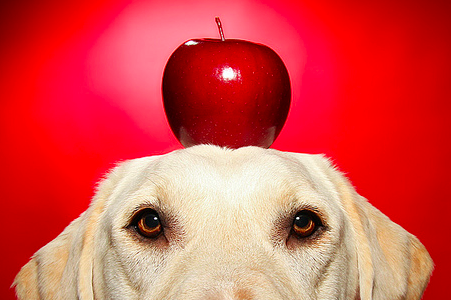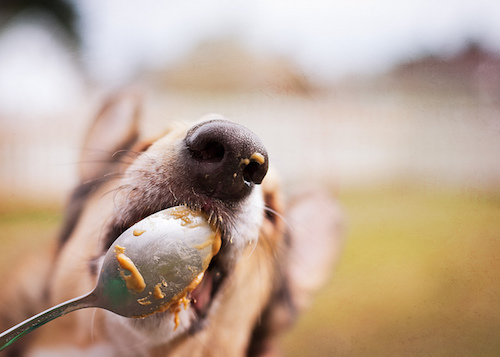- This post contains affiliate links. Read more here.
At least a dozen of our favorite human foods offer dogs huge nutritional benefits and can help combat common health problems, like digestive issues, skin infections, or weight gain. Some of these can be used to create delicious, healthy homemade dog food. You can also incorporate these foods into your dog’s diet by mixing them with healthy dry food, or as a treat. But be sure to introduce any new foods gradually, giving your dog’s system time to adjust. If you notice any unusual reactions, check in with your vet.
1. Eggs

Flickr / JoannaAliceDriver
Like the chickens who produce them, eggs are a great source of protein. They also contain essential fatty and amino acids. Eggs can even help settle a dog’s upset stomach. It’s best to serve boiled or poached eggs as a snack or with your dog’s usual bowl of food. Avoid raw eggs because of concerns about salmonella; fried or scrambled eggs are usually okay, but avoid adding unhealthy fats and skip the salt. Don’t keep eggs at home? Powdered eggs are a great alternative.
2. Green Beans
Green beans contain fiber, magnesium, vitamin A, vitamin C, and vitamin K. Serve green beans plain or try these all-natural green bean dog treats for the crunch appeal. Dogs will like them cooked or raw, on their own as a snack, mixed with wet dog food, or as an ingredient in homemade dog food. Fresh is best, but frozen or canned green beans are ok if they are the no salt added variety.
3. Carrots
Carrots are a healthy snack for humans and dogs, and a great substitute for traditional dog treats. They’re low in calories, high in fiber, and an excellent source of vitamin A and potassium. They can make for a cheap, nutritious chew toy, and can aid in dental health. Frozen carrots can soothe the gums of a teething puppy. Keep an eye on your dog so that he doesn’t try to swallow too large a bite. Fresh is best but frozen or canned carrots are great if they are the no added salt variety.
4. Pumpkin

Flickr / Mia N Nikki
Pumpkin is high in fiber and does wonders for the digestive system. It’s rich in fatty acids, which are good for the skin and fur. Pumpkin also contains beta-carotene, antioxidants, and tons of healthy minerals. Be sure to serve plain canned pumpkin not pie filling. Add a tablespoon to your dog’s usual meal. You can also freeze pumpkin puree in ice trays, then thaw and serve as needed. Raw and cooked pumpkin is okay too.
5. Sweet Potatoes
Like pumpkin, sweet potatoes are high in fiber, and contain vitamin B6, vitamin C, several beneficial minerals, and beta carotene, which is thought to help protect against cancer and heart disease. Add a teaspoon (for small dogs) to a tablespoon (for large dogs) of steamed or boiled sweet potatoes to your pet’s usual bowl of food. Single-ingredient sweet potato dog treats are an easy, healthy snack, too. Make sure to avoid candied yams, which are high in sugar.
6. Apples

Flickr / Scott Cromwell
Apples are a healthy, low-calorie, and affordable treat for dogs. They contain antioxidants, dietary fiber, vitamin A, and vitamin C. Like carrots, they help with dental hygiene and freshen the breath. It’s best to cut the apple into slices before serving. Be sure to remove all seeds and toss out the apple core. Unsweetened applesauce can be added to food or used to stuff a kong.
7. Bran Flakes
Bran flakes are high in fiber and great for your dog’s digestive health. They also help lower blood pressure and cholesterol while increasing your pet’s energy levels. Serve in moderation (too much can have a laxative effect), make sure the bran flakes are free of additives and sugars, and moisten them with warm water (to soften the flakes) before adding to dry or wet food.
8. Oatmeal
Oatmeal is a great source of soluble fiber, which can help older dogs with digestive issues. It also contains vitamin B6 and iron. Be sure to cook your oats first, and make sure they aren’t too hot before serving. Instant oatmeal can be used, but only unsweetened and unflavored varieties. You can add oatmeal to your dog’s usual bowl of food, or offer it with an egg for a more complete meal replacement. Is your dog loving oats? try a dry food with added oatmeal for a dialy fiber boost.
9. Peanut Butter

Flickr / Katie McLellan
Peanut butter is packed with protein, healthy fats, niacin, vitamin B, and vitamin E. But a word of caution: only allow your dog to enjoy peanut butter that’s unsalted and free of artificial sugars. (Xylitol, in particular, is toxic for dogs.) Serve in a Kong toy, occasionally share a few slurps as a snack, or use peanut butter to disguise medication as a delicious treat.
10. Greek Yogurt and Kefir
Both Greek yogurt and kefir are rich in probiotics, which can help your dog maintain a healthy gut. Both are particularly beneficial for dogs taking antibiotics, which can destroy some of the good bacteria in the belly. Greek yogurt and kefir also contain beneficial yeasts that help fight skin and ear infections. They’re also loaded with a number of vitamins and minerals. Serve a small amount on top of your dog’s food or on its own several hours after giving your dog antibiotics.
11. Cottage Cheese
Dogs can be lactose intolerant and don’t always digest dairy well, but cottage cheese is fermented and therefore contains very little lactose. It’s rich in calcium and protein, and its bland flavor makes it an ideal food for dogs rebounding from a stomach illness. Serve a little cottage cheese with your dog’s usual food, or on its own as an occasional treat. If your dog is getting over a touchy stomach, mix equal parts cottage cheese and cooked white rice or oatmeal for a soothing recovery meal.
12. Coconut Oil
Coconut oil contains healthy fats. One of these is known to be anti-bacterial, anti-viral, and anti-fungal. Coconut oil is also great for digestion and skin health. Introduce coconut oil gradually, starting with very small amounts (1/4 teaspoon for puppies) so your dog’s system can adjust. Remember coconut oil has about 120 calories per teaspoon so make sure to adjust other calorie intake accordingly.
Featured image via Canadian Podcast Buffet

